Equinoxer to activist: The making of a soldier in the war against the war on drugs
-
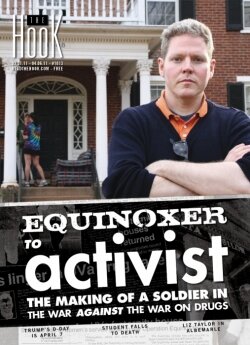 hook graphic
hook graphic -
The fraternity seizures made national news and got hefty coverage in the Daily Progress.Albemarle-Charlottesville Historical Society
-
On March 22, 2011, Graham revisited the scene of his arrest, what had been the TKE house.photo by hawes spencer
-
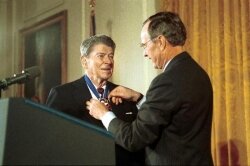 George H.W. Bush awards the Medal of Freedom to Ronald Reagan, who asked Congress to expand the death penalty from murderers to "drug kingpins."George Bush Library
George H.W. Bush awards the Medal of Freedom to Ronald Reagan, who asked Congress to expand the death penalty from murderers to "drug kingpins."George Bush Library -
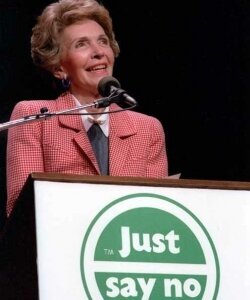 Nancy Reagan launched "Just say no" in 1982 (Click on photo to see her and slogan) when an Oakland schoolgirl asked her how to respond if offered drugs.White House Photographic Office
Nancy Reagan launched "Just say no" in 1982 (Click on photo to see her and slogan) when an Oakland schoolgirl asked her how to respond if offered drugs.White House Photographic Office -
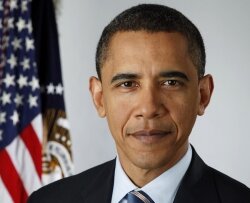 President Obama, the first president to admit some cocaine use, eliminated the five-year mandatory minimum penalty for crack cocaine possession when he signed the Fair Sentencing Act of 2010.Obama-Biden Transition Project/Pete Souza
President Obama, the first president to admit some cocaine use, eliminated the five-year mandatory minimum penalty for crack cocaine possession when he signed the Fair Sentencing Act of 2010.Obama-Biden Transition Project/Pete Souza -
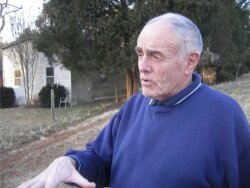 Retired Police Chief John deKoven "Deke" Bowen: "If I had to do it all over again, would I? Yep."file photo by Lisa Provence
Retired Police Chief John deKoven "Deke" Bowen: "If I had to do it all over again, would I? Yep."file photo by Lisa Provence -
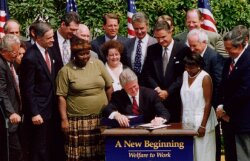 When Bill Clinton signed welfare reform, he made drug felons-- thousands of whom had merely possessed drugs-- ineligible for government assistance.U.S. Government
When Bill Clinton signed welfare reform, he made drug felons-- thousands of whom had merely possessed drugs-- ineligible for government assistance.U.S. Government -
Graham returned to Charlottesville on the 20th anniversary of Operation Equinox to denounce the War on Drugs.photo by Hawes Spencer
-
TKE sold this house to pay government fines. It now serves as a satellite house for another fraternity, Phi Delta Theta.photo by hawes spencer
-
Delta Upsilon got its house back late in 1991 by paying an undisclosed financial settlement. (In 2011, the fraternity moved to a new structure on Chancellor Street.)photo by hawes spencer
-
Phi Epsilon got its house back without penalty and later rejoined and took the name of a national parent, Zeta Beta Tau.photo by hawes spencer
-
Former CPD narcotics agent Chip Harding now regrets getting life sentences for drug dealers.photo by hawes spencer
-
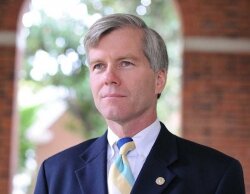 The drug war continues, as Governor Bob McDonnell just signed legislation making possession of more than half an ounce of synthetic marijuana, aka "spice," a felony carrying a potential jail term of 10 years.file photo by Jen Fariello
The drug war continues, as Governor Bob McDonnell just signed legislation making possession of more than half an ounce of synthetic marijuana, aka "spice," a felony carrying a potential jail term of 10 years.file photo by Jen Fariello
"Just say no." –First Lady Nancy Reagan
Jamie Graham did not say no. He said yes. In fact, he said yes many times. Yes to that bottle of champagne his friends were passing around in high school at a New Year's Eve party, yes to the guy who said "chug it." He said yes to trying marijuana on that very same night, though it never actually got him high the first few times. And, in the summer before college, Graham said yes to LSD. He'd been reading all about Ken Kesey and the Day-Glo acid trippers of the 1960s, and he'd gotten curious.
The only problem was, this Eagle Scout, debate team captain, and high school track star with a 4.5 GPA didn't know anyone who did acid. So he bounced the idea off of some of the students he tutored after school. Some of them had long hair, smoked, and looked like they knew how to get a hold of the stuff. Most of them laughed at their clean-cut 18-year-old math tutor when he asked about getting acid. But one did not. And within a few weeks, Graham had the first of what would be many experiences with LSD.
He said yes to the University of Virginia when he was offered an academic scholarship. And he said yes to Tau Kappa Epsilon when they asked him to pledge. He said yes to parties and long hair, yes to Grateful Dead concerts and Gulf War protests, and yes to the new world of freedom that is college life. And of course he said yes to his studies, maintaining an A average in most of his classes.
During his third year, Jamie Graham said yes to two other guys who appeared to be students when they asked him if he would sell them some acid. For a total price of five dollars, he gave them two hits of LSD. It was that last yes that sent him to federal prison.
"And yes, that little capsule sliding blissfully down the gullet was LSD." –Tom Wolfe
The U.S. Government's battle against illegal drugs was kicked into high gear in the early 1970s under then President Richard Nixon. The battle became an all out war under Ronald Reagan in the mid 1980s. Citing "epidemic" levels of drug use, Reagan stepped up funding for anti-drug forces, called for harsher punishments, and personally led an anti-drug media campaign right from the White House.
After the fall of the Communist regime in Russia in the late 1980s, the federal government refocused its attention on a new evil empire: drug dealers in our own backyards.
A long time ally of law enforcement, George H.W. Bush took the battle to new levels during his presidency. The War on Drugs got votes and big ratings. And it didn't seem to lose any popularity with the Clinton or George W. Bush Administrations either.
When Jamie Graham came to UVA in the fall of 1988, the War was well underway. He had no idea that he himself would be a casualty. Federal agents were busting down doors in the inner cities, in poor neighborhoods, on television, even in Panama. But not at a fraternity house near the insulated academical village of Thomas Jefferson. Things like that just didn't happen here.
"When a nation is at war, many things that might be said in time of peace are such a hindrance to its effort that their utterance will not be endured so long as men fight, and that no court could argue them as protected by any constitutional right."–Oliver Wendell Holmes
The Charlottesville Police Department, waging its own battles in the War on Drugs, conducted a series of undercover crack-cocaine busts in the late eighties. Rather than receiving praise, the city and its police department came under a barrage of criticism from members of the African-American community. It was charged that the police were unfairly targeting poor, black neighborhoods.
Then Chief of Police "Deke" Bowen took that charge and ran with it– all the way up the hill to the University.
"I'm critical of the academic-village mind-set," he said in 1991. "The students are not living in the real world."
So the police department would take the real world to them.
An undercover operation was initiated, focusing on the male students living in the fraternity houses. Various students were approached and secured as informants. Police Officer Mike Deeds grew a beard, tied a bandana around his head, and started going to parties. As far as anyone knew, Deeds was a JMU student in town to have some fun. Oh yes, and he liked to buy drugs: marijuana, ecstasy, shrooms, acid, you name it. He'd always have some cash on hand if you had any to sell.
It was Deeds and a student-informant named Tamir Noufi who approached Jamie Graham one day at his fraternity house. Graham didn't have the reputation of a big-time dealer, just an occasional buyer. But they had allegedly just been told by another student: "I don't have any hits left, but I just sold some to Jamie Graham. He might have some extra; go try him." So they went to the TKE house on Grady.
"Of course I remember the day they came by," Graham says. "I didn't really know either one of them that well, and I hadn't planned to sell the few hits I had left, so I told them no. At first. But then they followed me around, even up to my room, and I eventually gave them my last two doses. They gave me ten dollars, and I thought that was too much, so I gave them five dollars back. Then I told Mike Deeds I thought he looked like a cop. He just laughed."
"Where were you while we were gettin' high?"–rock group Oasis
The undercover operations came to an end about a month later, on the night of the Spring Equinox, March 21, 1991. The yellow crime scene tape went up. Crowds of students gathered along Rugby Road as television cameras started rolling. And federal, state and local law enforcement officials raided and seized three University fraternities. Under civil forfeiture laws, the property now belonged to Uncle Sam.
"Bush's war on drugs had finally stormed Animal House," wrote one reporter as the case made national headlines.
Jamie Graham was on the list of 11 students wanted on federal and state charges. He went and turned himself into the Charlottesville Police Department. He needn't worry about his exams that semester.
As spring gave way to summer, the Operation Equinox court cases heated up. Some students rolled over and gave the investigators some names; other people were later indicted, and a trail of distribution from the southwestern U.S. to Charlottesville was unearthed.
Graham refused to give up any names, but in return for a lesser sentence than the five years with which prosecutors had threatened him, he agreed to plead guilty to a federal charge of distribution and accept a sentence of 13 months. He went to prison at 3:30pm on September 3, 1991.
"Just surreal," he recalls. "The whole thing: the crazy trial, being paraded back and forth in front of cameras with handcuffs on, it was so surreal. Actually going to jail was simply terrifying."
Graham left behind such titles as Echols Scholar, fraternity brother, and university student. He was now inmate #02806-084 at the Federal Correctional Institution in Petersburg.
"But the man who comes back through The Door in the Wall will never be quite the same as the man who went out."–Aldous Huxley
Graham shared a 250-person dormitory with embezzlers, tax evaders, and other mostly white-collar criminals. He was even welcomed by other UVA alumni serving time. There was a cafeteria, classroom, weight room, track, and a volleyball court at the prison camp.
"Once you got past that initial fear of the unexpected," he says, "it's pretty much just depressing boredom until it's time to leave."
Shortly after he was locked up, Graham and his fellow inmates were joined by Washington, D.C., Mayor Marion Barry, who was dealing with his own high-profile drug conviction. Graham remembers working alongside the mayor in the boiler room.
"Well, we were getting 29 cents an hour to watch the water levels. He had heard of my case, and I had certainly heard of his," says Graham.
"We would talk some, but not that much. The way he was treated, you'd think he was still the mayor of Washington. He spent most of the time promising jobs to everyone when he got out."
(Barry was later moved to another facility after allegations that he was receiving oral sex from a female visitor in the public lounge. He would go on retake the office of mayor of Washington.)
With all that spare time on his hands, Graham immersed himself in civil libertarian literature. In the required drug abuse classes, he spoke up for legalization. He began to identify himself as a victim of his government. He read subversive literature late at night in his top bunk with a flashlight. He cited Supreme Court cases to his prison mates, as well as writings by Nietzsche and Orwell.
And he began to feel more at home among the disenfranchised prisoner rather than with the privileged kids he'd known growing up.
"When you're on the inside," he says, "you're alienated from everything in the outside world; from your family and friends, from your whole past. You're thrown into an inside world where you live, eat, and work with criminals. You just start seeing the world differently. Your perspective changes. The land of the free has a different ring to it when you're in prison."
"When I came out of prison ... I saw yet more distinctly the state in which I lived." –Henry David Thoreau
With 51 days off for good behavior, Jamie Graham was released from prison on August 11, 1992. Like nearly all the other students charged in Operation Equinox, he returned to UVA and completed his coursework for a degree.
Graham graduated as an Echols Scholar with a 3.7 grade-point average. He was also a convicted felon, so he could not vote, and he could not run for president. Not that either one figured prominently on his bucket list. What he really wanted most to do was to speak out against the War on Drugs.
"The whole thing became a personal issue for me when they sent me to jail," he remarked. "I really don't see any reason to continue talking about what happened, except for the fact that there are still people in jail, and going to jail every day, for drug crimes; and I don't think they should be there."
Whereas once he had sat around in the fraternity house debating drug legalization, now he speaks to university groups and think-tanks like the Cato Institute. He was in Charlottesville for just such an occasion, exactly five years after the Big Bust, and again 20 years later.
His talks have been sponsored by the Students for Individual Liberty and the UVA chapter of NORML, the National Organization for the Reform of Marijuana Laws (the latter of which he co-founded as a student).
"Let every man make known what kind of government would command his respect, and that will be one step toward obtaining it."–Henry David Thoreau
"If the cops can put me in these things for dramatic effect," says Graham, wearing handcuffs at a 1990s speech, "then I can use 'em too!"
He tells the students, who likely know nothing about the high-profile operation, how the houses were seized and later sold back to the fraternities, and all about his trial and prison life. They watch him with a strange sense of awe.
"This is my body," he tells them. "It does not belong to the federal government. It does not belong to a majority of Americans either. It belongs to me. I will take advice, but I see myself as having final say about what I do with this body."
He puts the question to them: "Am I just a commodity to be made most productive for the economy, or am I a self-autonomous agent?"
From Graham's perspective, the War on Drugs is a war on civil liberties. He looks around the room: "If you don't do drugs, don't think that this War doesn't affect you. If they reduce the rights for any one group in this country, they reduce the rights for all. For that reason, if you don't think that what's going on in the poor, black neighborhoods has something to do with your future, then you're in for a shock. I was."
"The real drug world at UVA, " he says matter-of-factly, "is a bunch of people sitting around on old couches just talking."
The crowd laughs hesitantly. For the students in the audience who use narcotics, Graham represents the worst of all possible fates. His ordeal is a horrible reminder that no college student lives in a safe, warm bubble. The scenes– seemingly out of the Cops TV show– were not videotaped in L.A. or New York, but took place in and around Rugby Road, just after spring break. Yes, they seem to be saying, it does happen here.
Does that awareness, that fear, cause them to throw their dope away? Probably not. As one unidentified student said later, "I don't know exactly what it was like when they raided those fraternities. But I can tell you there's still a lot of drugs around; different kinds, all over the place. The only thing is, they've gotten much better at hiding it. They're careful... and suspicious."
"I simply wish to refuse allegiance to the state, to withdraw and stand aloof from it effectually. In fact, I quietly declare war with the state..."–Henry David Thoreau
So now we have a clearer idea what might happen to a bright kid who goes to prison: he becomes an activist.
Of course this didn't happen to all of the students who went to jail after Operation Equinox. Most just went back to school, got their degrees, and tried to forget the whole thing ever happened.
But not Jamie Graham. He won't ever let anybody forget. For better or for worse, his path in life was forever changed on the night of March 21, 1991.
Oh, you may disagree with his approach to the legalization of drugs: is it really a civil liberties issue, for example, when you consider the costs of drug abuse and drug-related crimes? You don't do drugs alone out in space after all. What about the guy driving stoned next to you on the highway? Doesn't government have a responsibility to protect its citizens from one another?
Jamie's response: "Yes, but first we must ask, who protects the citizens from their government?"
You could also say that he has an exaggerated, almost paranoid, idea of the "they" that are out there trying to snatch our freedoms away. But for someone who has gone through what he has, it's not too great a stretch to see where he's coming from.
For those who think that he simply travels around extolling the virtues of drugs, think again. From his home base in an inner city neighborhood of Philadelphia, Graham has volunteered for a variety of progressive and sometimes even "anarchist" organizations, including ACT-UP, the confrontational HIV-awareness campaign. He's demonstrated for prisoners' rights, collected donations of food and clothing for the homeless, and he lends his time to African-American revolutionary groups.
He says his activism all began on the evening of March 21, 1991.
***
Epilogue
The above is a lightly edited version of a story penned over a decade ago. Not everyone has held so steady in his positions.
Consider Albemarle Sheriff Chip Harding. In 1984, he became Charlottesville's first full-time narcotics officer working to put drug-sellers and users behind bars, and in 1991, he's the one who wrote the affidavits for the seizure of the fraternity houses.
"It sent a message of equality in enforcement," says Harding, "that your social status didn't give you immunity from the drug laws."
It's those drug laws that Harding's no longer so comfortable about: "No one I know sees a light at the end of this awful tunnel."
Harding wrote those words in an essay for Virginia Police Journal back in 1995, just four years after Equinox. Today, his skepticism about the War on Drugs has intensified, and he has been joined by a growing chorus– one that includes California Governor Arnold Schwarzenegger and the outgoing U.S. senator from Virginia, Jim Webb.
"I do think our country needs to step back," says Harding, "and take a look at decriminalization. Why not put the money into education, prevention, and treatment?"
The nation of Portugal did just that in 2001, and the free-market-leaning Cato Institute found that pushing treatment, not prisons, has lessened social ills.
Harding says the demand is just too strong to focus on cutting off the supply. The horrific violence that's destroying Mexico is testament, he says, to the failure of a policy based on trying to nab dealers and intercept shipments.
"I'll be in a bar, and there will be a news report of a ship seized with two tons of marijuana. And somebody will say, 'That will put a dent in the drug traffic.'"
Hardly, says Harding.
"For the dealer, that's just a cost of doing business," he says. "You cannot arrest enough dealers to stop it. There is always– and I mean 100 percent– always someone else to fill the gap. It's like stepping your foot in a mud puddle; the water closes that fast."
And as for his own decade of work on the narcotics beat, this former Charlottesville police officer concedes that he now feels regret for some of the cases where multiple buys– but no violence– consigned young men to decades behind bars.
"There are people now serving life sentences," says Harding, "that even at the time I didn't feel good about it in my gut."
When Congress signed Ronald Reagan's 1986 Anti-Drug Abuse Act, they eliminated parole and created minimum sentences– including five years for possessing five grams of crack cocaine– that took discretion away from judges and nearly guaranteed that crack possession would be a felony.
"I saw one dude who got 12 years, and he was actually happy." So says David Brown, an outreach worker at the Haven, a help-for-the-homeless center on Market Street.
Brown says that he sees many homeless people who carry not just the emotional stigma of felony conviction but a legal stigma that prevents them from receiving any government aid– including public housing, welfare, and food stamps.
While it was a much-heralded part of the welfare reform bill signed into law by President Bill Clinton in 1996, the denial of government aid can serve as one more reentry barrier from jail into society, says Brown.
The punishment disparity between crack and powder cocaine would be lessened by the Fair Sentencing Act, signed last year by Barack Obama. "But it's already done so much damage," says Brown.
"You've got this lifetime mark that confines you to second-class citizenship," says Graham.
While the college-educated Graham emphasizes that his reentry problems were minuscule in comparison to those of the underprivileged, he relates that his early jobs were typically limited to short-order cooking and under-the-table construction work. When he got his first desk job, as a proofreader at the National Legal Research Group, his past came back to haunt him.
Out at a dinner on what was then called Secretary's Day, his supervisor allegedly was boasting of her own college drug use.
"I told her I actually got arrested, and the next day I got fired," says Graham. "There's a lot of hypocrisy."
A reporter reached out to several other Operation Equinox convicts– including an engineering professor in North Carolina and a lawyer in California– but besides Graham, found just one willing to talk about the ordeal.
"Getting pulled over for speeding would turn into a 90-minute drug dog-sniffing experience," says Mark Edward Croy, who is back in Charlottesville as the neighborhood marketing director for 11 Panera Bread stores.
Croy enthuses about his job, says the Panera people know all about his past, but concedes that the Operation Equinox convictions cost him his life's ambition.
"I couldn't work in the foreign service, which was the only reason I went to college," says Croy.
In the wake of Operation Equinox, UVA set up a presidential task force and began focusing on educational methods, according to Susan Bruce, the director of UVA's drug-prevention center.
Although she wasn't able to produce 20-year statistics, Bruce notes that the relentless climb in UVA's academic profile may have played a role in giving UVA a lower level of illegal drug abuse than other colleges.
"We see way more harm from alcohol abuse," says Bruce, noting that a majority of students report using alcohol while just 1.3 percent of UVA undergraduates reported that they'd used cocaine in the past month, a figure that's fallen by half in the past decade.
One relatively new category of drug abuse is prescription stimulants, the so-called "study drugs" such as Ritalin and Adderall, which get used each month by 2.3 percent of UVA's students. More popular is marijuana, smoked monthly by 14 percent of UVA undergrads with 24 percent of UVA students reporting some pot use in the past year.
Recently, as Jamie Graham toured his old fraternity house, an amiable young man, presumably a UVA student, listened to the story of a year spent in jail due to a five-dollar drug deal and that fateful night 20 years ago when over 100 officers convened to make arrests and seize three fraternities– to send a message that selling marijuana, ecstasy, LSD, cocaine, and hallucinogenic mushrooms was against the law. And that even college students had to obey the law.
"That's f*cked," said the young man. "You know it's kinda funny," he remarked, smiling at a friend, "we just did a transaction."
~
Coy Barefoot wrote this story for publication in C-Ville Weekly in 1996. Hawes Spencer penned the epilogue.
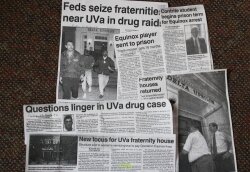

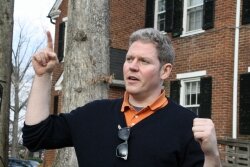

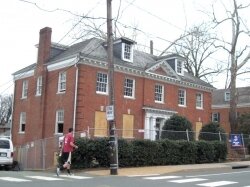

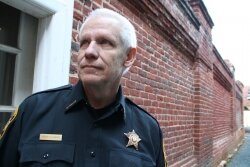
27 comments
Alcohol prohibition in the US run from 1919 to 1933 - Now google 'The Great Wall Street Crash' and see when that happened!
During alcohol prohibition, all profits went to enrich thugs and criminals. Young men died every day on inner-city streets while battling over turf. A fortune was wasted on enforcement that could have gone on education etc. On top of the budget-busting prosecution and incarceration costs, billions in taxes were lost. Finally the economy collapsed. Sound familiar?
http://1929crash.com/
China has recently been in negotiation with a number of countries, asking them to replace the Dollar with the Chinese Yuan as their reserve currency. This, when it happens, will remove the Federal Government's ability to keep printing cash to cover the trillions it costs to fund prohibition. It’ll mean true freedom but the transition period may well bring consequences that are far more horrific than a slasher movie. -- It never had to be this way; we should have learned our lesson from studying the mayhem that alcohol prohibition wreaked on us.
We all have our victories and defeats as regards fear, but most of us strive not to let fear rule our hearts or our minds. Being free means being free to live and love as if death and fear had no power over us. Freedom also means that we have an ethical and moral responsibility to expose blind hate, lies and ignorance by shining eternal light, truth and love, sending such dark forces fleeing to the shadows from whence they came.
We explore outer space with various forms of space craft, but many choose to explore inner space via nature's abundant chemistry - an infinite journey into the heart of God. Whatever, we are here to explore this glorious universe. The Prohibitionist's brand of hateful, choking pseudo-Conservatism is the antithesis of all that. Like a lion who cannot grasp that he can do more than walk in a circle the size of the cage he's recently been freed from, the prohibitionist is incapable of exploration beyond the boundaries of his own fear, prejudice and loathing. We are all free to choose how we walk our own path, but when we choose to go beyond this by supporting drug-war demagoguery, to the point of even threatening others with violence and imprisonment, we loose the right to expect any form of respect from that once free and prosperous society that we are helping to totally destroy.
Thanks to prohibition we're about to lose all semblance of that once ordered, prosperous and safe society. Myself, along with many others, have been debating prohibitionists on this for many years. We have shown what destruction prohibition has wrought on all the civil institutions of this once great nation, -we've always provided facts and statistics - they, the prohibitionists, have countered with either lies, personal abuse or even serious threats of violence.
Ending the insanity of drug prohibition by legalized regulation, respecting the rights of the responsible users and focusing on addiction as a sickness, like we do with alcohol and tobacco, may save what remains of our economy and civil institutions along with countless lives and livelihoods. Prohibition continues unabated for shameful political reasons. It cannot, and never will, reduce drug use or addiction.
Prohibition has permanently scarred our national character as well as our individual psyches. Our national policies and cultural practices have become pervaded by the fascistic, prohibitionist mind-set which has turned our domestic police force into a bunch of paramilitary thugs who often commit extra-judicial beatings and executions while running roughshod over our rights in order to "protect us from ourselves".
When we eventually manage to put the horrors of this toxic moronothon behind us, we'll need to engage in some very deep and honest soul-searching as to what we want to be as a nation. Many of our freedoms have been severely circumscribed or lost altogether, our economy has been trashed and our international reputation for being "free and fair" has been dragged through a putrid sewer by vicious narrow-minded drug warrior zealots who are ignorant of abstract concepts such as truth, justice and decency. We'll need to make sure that such a catastrophe is never ever repeated. This may mean that public hearings or tribunals will be held where those who have been the instigators and cheerleaders of this abomination will have to answer for their serious crimes against our once prosperous and proud nation.
Each day you remain silent, you help to destroy the Constitution, fill the prisons with our children, and empower terrorists and criminals worldwide while wasting hundreds of billions of your own tax dollars. Prohibition bears many strong and startling similarities to Torquemada's inquisition, it's supporters are servants of tyranny and hate. If you're aware of but not enraged by it's shear waste and cruel atrocities then both your heart and soul must surely be dead.
Prohibition engendered black market profits are obscenely huge. Remove this and you remove the ability to bribe or threaten any government official or even whole governments. The argument that legalized regulation won't severely cripple organized crime is truly bizarre. Of course, the bad guys won't just disappear, but if you severely diminish their income, you also severely diminish their power. The proceeds from theft, extortion, pirated goods etc. are a drop in the ocean compared to what can be earned by selling prohibited/unregulated drugs in a black market estimated to be worth 400,000 million dollars. Without the lure and power of so much easy capital, it's also very unlikely that new criminal enterprises will ever fill the void left by those you successfully disrupt or entirely eradicate.
Millions of fearless North Africans have recently shown us that recognizing oppression also carries the weight of responsibility to act upon and oppose that oppression. Prohibition is a vicious anti-constitutional assault on ALL American citizens by a criminally insane and dysfunctional government, which left unchallenged will end with the destruction of the entire nation.
“I see in the near future a crisis approaching that unnerves me and causes me to tremble for the safety of my country… Corporations have been enthroned, an era of corruption in high places will follow, and the money-power of the country will endeavor to prolong its reign by working upon the prejudices of the people until the wealth is aggregated in a few hands and the Republic is destroyed.”
– Abraham Lincoln, November 12, 1864
"Whenever any form of government becomes destructive of these ends [life, liberty, and the pursuit of happiness] it is the right of the people to alter or abolish it, and to institute new government…"
- The Declaration of Independence July 4, 1776
It really sucks when big pharma and fascist corporations hijack your republic!
Remember, the War on Drugs is just the man trying to oppress you, kids! Be like the hero of this story and watch your life full of opportunity and potential turn into a living hell where you're working for pennies in some jail! Fight the power, it'll only cost you your future and maybe your rectal virginity, it's a small price to pay for fighting the system!
Break the law you pay the price, then you get to cry about how unfair it is that you made a decision and now have to pay for it.
The war on drugs has got to end. It's an incredible waste of humanity. I am no fan of drug addicts, but the answer is treatment on demand, not throwing them and casual users in jail. Keeping unjust, unenforceable, ineffective laws on the books only fosters disrespect for the rule of law in general.
@BB, the guys in the story took their punishment and are trying to make a difference now. If you think that is whining, I feel sorry for you.
Let's go back a few more years. Ask yourself why Albemarle Sheriff Chip Harding became Charlottesville's first full-time narcotics officer working to put drug-sellers and users behind bars in 1984. It's because Charlottesville Detective Bobby Hughes and Albemarle Sheriff's Deputy Wayne Davis received no support whatsoever when they attempted to enforce the drug laws way back in the early 70s. They both felt the sheriff and police chief did not want the citizens to know that the drug problem was rearing it's ugly head in this area. And nowhere in the history pages of Charlottesville or Albemarle County will you ever see their names mentioned as the first law enforcement officers who tried to make a difference in the drug trade in this area.
The question I have is if we had abandoned the drug war a decade ago and tried to "educate" people would the stats about drug use at UVA be higher or lower? would the number of meth labs be more or less than today? Would the streets of DC have more or less crack whores?
The government has abandoned the drug issue in most gettos already allowing the gangs to prosper so long as they don't kill each other. Drug abuse has increased and the ER visits are more frequent.
I am for decriminalizing pot but punishing abuse of other drugs with quicker prosecutions and nastier jail times. This guy should have gotten 90 days of hard time instead of less than a year of ping pong.
The time for legalization, regulation, and taxation has come. It simply costs too much to investigate, prosecute, and incarcerate nonviolent "offenders."
Not too much has changed. A few years ago there was another undercover operation at UVA. One of my students was repeatedly pestered by undercover LE to sell a few grams of cannabis. When she finally gave in, she was arrested as a drug dealer and threatened with years in prison. She managed to stay in school, but her whole life was turned upside down by the event--she had to attend anti-drug propaganda classes several times weekly, and carried with her a list of OTC meds she couldn't take because they'd give false positives on her regular drug tests.
At the same time this shameful stuff is happening, the director of UVA's student health is in bed with Anheuser-Busch, taking funds from them to develop "social marketing" approaches to alcohol abuse at UVA. Funny how alcohol is the one substance Susan Bruce cites in the article as causing the most problems. Yet instead of threatening underage drinkers with jail time, UVA partners with producers of the drug to teach young people how to drink "responsibly."
An objective review of scientific evidence would show much less harm from the use of cannabis, LSD, psilocybin mushrooms, and likely even cocaine, than from alcohol. Yet the University continues to adopt policies that encourage a distorted view of the relative risks of these substances, and push people toward more dangerous intoxicants.
End it already. Chip Harding for president.
For more consequences of the war on drugs, read "The New Jim Crow".
For the amount of drugs actually found, Operation Equinox was one of the biggest waste of LE resources we have seen. It was done to show UVa students that they were not immune to the law. A laudable goal, perhaps, but this went far beyond the bounds of reason.Politics, nothing else.
Crack cocaine destroyed entire communities and lives. What Jamie Graham and his friends were doing was in no way comparable, with their casual use of recreational highs.
Reminds me of all the effort being spent in LA to try and put Lindsay Lohan beyond bars-from nothing more than a first DUI that did not involve injury to anyone.
If addiction is a medical problem, then there should be no criminal penalties.Then again someone who makes a mistake in judgment and drives home from a party after one too many should not automatically be branded an alcoholic. Some are, but many of us are not.
Jamie Graham chose to become a crusader for justice after his experience, not an embittered career crininal. That is commendable.
Weed should be taxed and legal and grown organically and should be used by adults with a vaporizer since using a vape is cleaner and healthier than smoking it in my well educated opinion. Meth, heroin, crack, coke, ecstasy, and all that other crap should remain illegal.
Operation Eq. was a huge waste of resources, but drug dealers generally aren't the kind of people you want to take to grandmas for Sunday brunch either.
In the next 15-20 years weed will be grown by Altria, and other huge multi-national corps, and many more states will have dispensaries....
I would like to thank Hawes Spencer for the great work he did on this article. I know how much digging he did for this article, so I appreciate reading the follow-ups from Chip Harding and Deke Bowen.
I gotten used to reading the old know-nothing "you do the crime, you do the time" comments that some chowderhead ineveitably posts whenever I read a story on the drug war. If its MY BODY, what is the CRIME? With the banksters' stealing billions on Wall Street and not doing a day in jail, I'm amazed that anyone can say that the government should be focusing its resources on jailing folks for what they do with their own bodies in their own homes.
I wonder what happened to the student informant. Did he grow up to be a professional tattletale?
BB has, perhaps, some authority issues to work out. To be so exuberant about the imposition of state power on other people is really a bit disturbing.
I am happy that this article places appropriate emphasis on the disgraceful roles Reagan, Bush and Clinton played in building our sorry drug war up to a sustained fever pitch. Anyone might hope that later presidents would see things differently, but the only realistic hope for substantial change in this area of policy has got to be based on the kind of grass-roots organizing going on now in our Western states. We have built up a thick conglomerate of institutions that, almost purely of their own inertia, insist that we all must acquiesce in the draconian mistakes of the past. But we are still people, and individuals, with the capacity to live humanely and to reorder the institutions appropriately. Don't give up!
Drugs like many bad decisions lay at our disposal individually. If the state thinks such things are such a bad idea, they should find a more persuasive way to convince people to make good decisions. Prison isn't a good solution. It's bad for the drug user and it's worse for the tax dollars. It's even worse because people in the prison system don't contribute to the GDP.
The War on Drugs is a fools errand. Why don't we focus on a Race to Be Well Educated?
Wow, the cover looks almost exactly like last weeks. Really lame for such an interesting story.
Without a victim, there can be no crime. Can someone tell me where the victim is in someone dropping acid within the safe confines of their own home?
Operation Equinox and the rest of the "war" on drugs has been a farce. Let's legalize, tax, and be done with it. We can't afford to waste more resources chasing someone whose so-called crime has caused no harm to any other citizen. Get the state out of my body and my mind.
John Casteen III, the man who set up UVA's presidential task force to focus on educational methods to reduce drug use now works for the tobacco industry, some of the biggest drug pushers on the planet. I wonder what his thoughts on truthful education about that nasty substance are.
Operation Equinox was an absolute joke. A complete waste of resrouces on those who posed no threat to the community.
The War on Drugs has been an absolute failure and it's continuing presence is a disgrace.
The war on drugs will likely continue into the far foreseeable future because it's very nearly a religious thing for the powers that be and it's full of symbolism about the need to "hold the line" against what is perceived as a threat to "moral standards" and it also keys into the morbid fears of millions of frightened parents.
It's interesting to read some of Chip Harding's recent musings on the subject after so many years. As a young man he worked alongside many young people who worked for the juvenile court and he attended parties where people smoked pot and "sat around on old couches talking", but for reasons relating to "standards" he grew up with he always refused to partake. He aspired to join the FBI, but did not make it. So he ended up as a city cop and threw himself enthusiastically into making himself a specialist in drug crimes and into the casual drug user's nemesis. Now of retirement age he can step down to the "kinder gentler" role of Sheriff and opine about the need for a shift in priorities. He's a bit of a slow learner about this, maybe even "obtuse" like the warden in "Shawshank Redemption". He had all the information at hand to see things as he does now, all the way back in the late seventies, but he would not see things that way, so in his long career he bears the responsibility for ruining countless lives. His late life epiphany about the "war on drugs" reminds me of Albert Speer. or Bob Macnamara. Do great harm and then talk later in an objective sense about "mistakes were made".
People working in an official capacity in the "war on drugs" are part of an organized movement to persecute people, to criminalize private conduct, and to ruin the lives of countless thousands of otherwise innocent people. They also create a situation where the black market these laws foster causes the emergence of an entire ruthless criminal class whose risks are so high they must resort to violence to protect themselves while they supply the wants of drug users who have no alternative source of supply. This class of people would not exist but for the "war on drugs" and ironically their existence is one of the tautological arguments used by supporters of the "war on drugs" to justify its continuance, even its expansion.
Angle Eyes
Very good post. I wouldn't doubt---i would actually hope---that is his conscience is bothering him or that at least he recognizes the role he played in the destruction of people's lives. Not told in this article are those young black men sent to Prison for 10 years for selling one crack rock.
More so Police Officer Mike Deeds is the one who has to live with himself. Lying and pestering harmless ppl like jamie to sell him 1 hit and then watching him face a decade in prison after he agrees to it. I, for one, don't know how one could do something like that.
Karma is a b*tch tho...
Tamir Noufi, the informant, had been threatened with deportation to Jordan. After he cooperated with the police, the government charged him anyway, even using some of the guys he got busted to testify against him. Tamir did offer to testify on my behalf about the police entrapment at my trial, but they threatened me with five years for "trafficking in a school zone," based on my hanging out with Matt Evans. Matt was going to testify to drug sales he committed in my presence- under immunity- while I would held responsible under "conspiracy," if I didn't plead guilty to the distribution charge and take the 13 months.
I would guess that Tamir was deported to Jordan after going to a federal prison for a while. I remember hearing that he was sentenced on the radio on the day I reported to my PO in Charlottesville for the first time after getting out of Petersburg. I also ran into Matt Evans in the waiting room in the federal building. He said he wouldn't have really testified against me. I told that he shouldn't worry and that I wasn't going after him or anything, but that I probably wasn't going to hang out with him after this. He's a professor somewhere now.
Anyway, I don't bear either these guys much ill will currently. It was just a year of my life twenty years ago. Much worse things happen to folks- it's like Operation Equinox every month in the African-American community- and it's led to my doing what I do now.
Poor little rich uva boy....did he play lacrosse????
We are losing the war on drugs, but at least we are taking a lot of prisoners. Legalize and tax drugs, and thereby take the violence out of the marketplace.
PS if legalization does not work, we can make marijuana, coke, herion etc. illegal again.
Legalize marijuana, PLEASE.
The War on Poverty hasn't failed miserably. If we get rid of one, let's get rid of the other. The only people that have been helped are those providing the services.
The War on Poverty hasn't failed miserably. If we get rid of one, let's get rid of the other. The only people that have been helped are those providing the services.